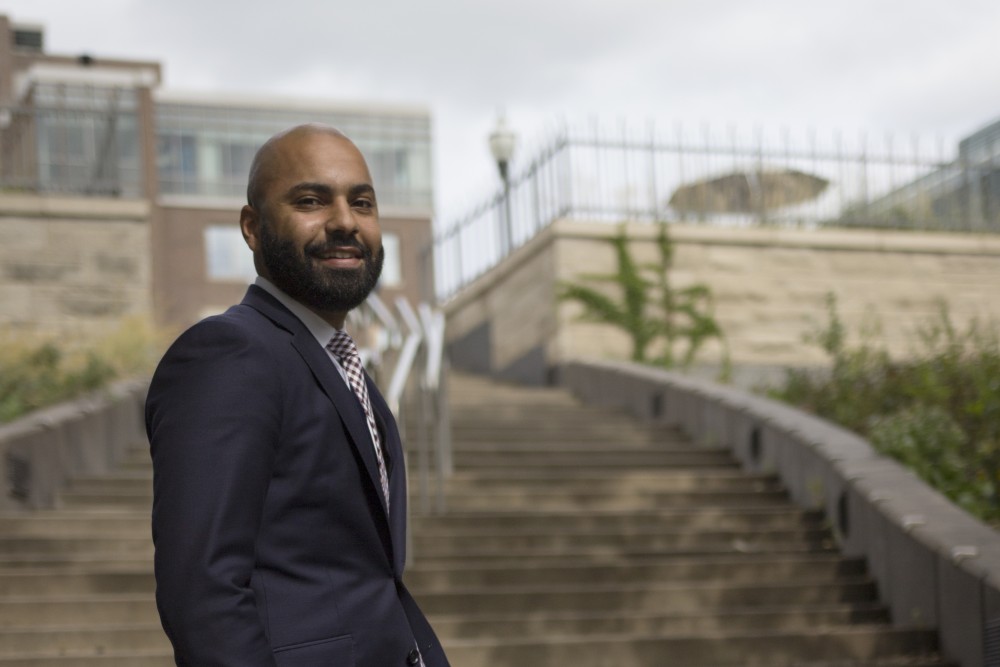For Regent Abdul Omari, everything comes back to relationships.
Abdul Omari — tasked with leading the Search Advisory Committee to help choose the next president of the University of Minnesota — believes that the emphasis he places on authentic interactions within the committee and with candidates will make the search successful.
Omari realized the importance of reliability at a young age. Growing up the youngest sibling in a blended family filled with Type A personalities, Abdul Omari managed to stand out, said his sister Mariam Omari.
“A leader who knows the people around him can actually lead for the people,” Omari’s sister said. “[Abdul Omari’s] ability to lead for people is much higher than those who don’t maintain relationships with people.”
Abdul Omari said his emphasis on connections was influenced by his upbringing and family. Raised by immigrant parents in a mixed religion household, Omari said he learned to navigate complex relationships early on.
While Abdul Omari has always been drawn to leadership positions, serving as a student representative to the Board of Regents from 2010 to 2012, his style of leadership has evolved over time, said Keith Mensah, a friend of Abdul Omari’s.
“I’ve seen him play with different leadership styles and I think he’s found a good groove,” Mensah said. “I don’t think he’s ever been inauthentic, but I think he’s being more himself as the years go on.”
Forming lasting connections with people influences everything Abdul Omari does, from interacting with other regents to spending time with family to founding a public speaking and mentoring enterprise, Mensah said. That’s helped him learn to empathize, which in turn has enabled him to better understand how the decisions the board makes will affect the broader University community, according to Mensah.
Abdul Omari said there were three factors that drew him to the board: his background as a student at the University, his global perspective as the son of immigrants and his ability to bring a new perspective to the board as a young person of color.
“There’s no denying that from a pure numbers standpoint, there’s going to be a new wave of students who will have had similar experiences to me as somebody with immigrant parents,” Abdul Omari said. “I hope that I’ve been able to bring some experiences, some thoughts, some wisdom from that demographic.”
While Abdul Omari has faced challenges working with the board, he said that his doctorate degree, preparation and thoughtfulness have helped him over the past five years.
“I think that anytime there are voices at a table that are often overlooked, it will be more of a challenge to get your voice heard, so I think being a younger person on a board that is traditionally [made up of] more seasoned individuals, there can be some different values placed on voices,” Abdul Omari said.
Reuben Thompson-Amarteifio, a friend of Abdul Omari’s from college, said that Abdul Omari’s Minnesota background and three degrees from the University means that he understands a student’s perspective.
Thompson-Amarteifio said his friend isn’t afraid to ask tough questions and takes time to get to know people, which is invaluable during a search like one for the next University president.
Mensah said Abdul Omari will ensure that whoever takes over as president will be well suited for the job.
“What makes [Abdul Omari] different is that he’s super strategic, he’s very, very cerebral,” Mensah said. “He thinks a lot and he does a lot at the same time, so he has this good balance.”
Mariam Omari said her brother’s dedication to his role as chair of the Presidential Search Advisory Committee demonstrates his desire to build and maintain relationships with candidates, faculty, staff, students and the greater Minnesota community.
“To be doing what he’s doing just to dedicate the time to chairing the presidential search of a University is a selfless act for somebody who has no children,” said Mariam Omari. “[I admire] his investment [to] truly help shape our future.”








